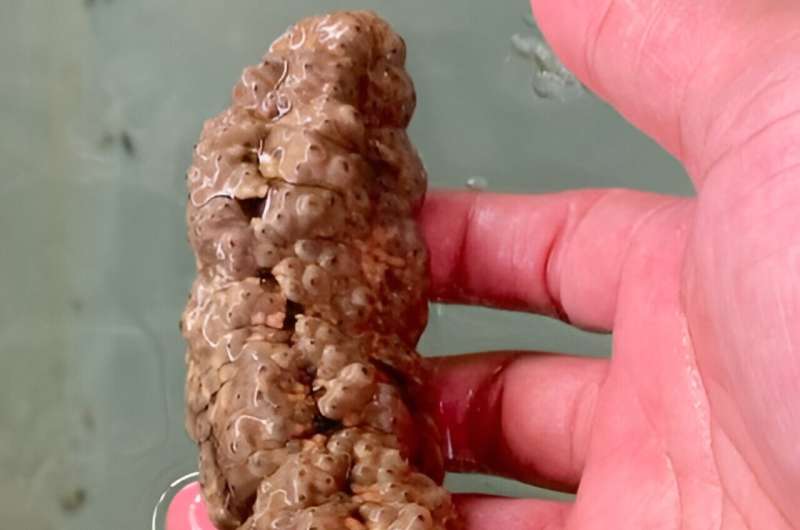December 8, 2023 report
This article has been reviewed according to Science X's editorial process and policies. Editors have highlighted the following attributes while ensuring the content's credibility:
fact-checked
peer-reviewed publication
trusted source
proofread
Study of Philippine sea cucumber shows it may have biomedical applications

A small team of marine scientists and chemists at the University of the Philippines, The Marine Science Institute, has found that a type of sea cucumber found locally may have biomedical applications. In their study, reported in the open-access journal PLOS ONE, the group conducted a metabolomic study of Stichopus cf. horrens, a species of sea cucumber found off the coast of the Philippines.
The sea cucumbers found off the coast of many Philippine islands and other parts of Southeast Asia, like those of related species in Asia, have for a long time been considered both a culinary and medicinal delicacy. After retrieval from the sea, they are typically dried before sale to the public. In this new effort, the research team noted that very little research has been done on the species; thus, it is not known if claims of medicinal benefits are true. To find out, they conducted a study in their lab.
The researchers obtained several samples of the cucumbers and conducted a metabolomic analysis—a process that involves chemical and biological analysis with the goal of identifying compounds that can be used as either a food source or a medical therapy.
They found the sea cucumbers had an abundance of bioactive compounds in the material that makes up the walls covering its body and also in several of its internal organs.
Among the compound types they found was phosphatidylcholines, which are found in a wide variety of foods, such as soybeans, eggs, sunflowers and mustard. Some studies have suggested such compounds can provide relief for pain associated with ulcerative colitis—the compounds tend to reduce inflammation in the gastrointestinal tract when ingested.
The research team also found several phosphatidylethanolamines, which they note are likely linked to a stress response by the sea cucumbers when presented with a threat, such as humans harvesting them from the sea floor. They suggest that more study of the sea cucumbers could reveal useful compounds and how such compounds are impacted by processing methods.
More information: Vicenzo Paolo M. Torreno et al, Comprehensive metabolomics of Philippine Stichopus cf. horrens reveals diverse classes of valuable small molecules for biomedical applications, PLOS ONE (2023). DOI: 10.1371/journal.pone.0294535
Journal information: PLoS ONE
© 2023 Science X Network



















